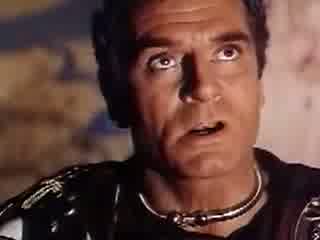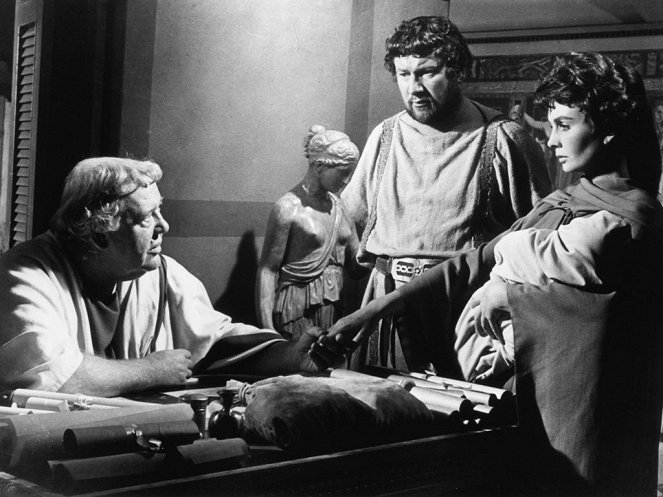Rendező:
Stanley KubrickOperatőr:
Russell MettyZeneszerző:
Alex NorthSzereplők:
Kirk Douglas, Laurence Olivier, Jean Simmons, Charles Laughton, Peter Ustinov, John Gavin, Nina Foch, John Ireland, Herbert Lom, John Dall (több)Streaming (3)
Tartalmak(1)
Spartacust (Kirk Douglas), a forrófejű rabszolgát egy gladiátoriskola tulajdonosa, Lentulus vásárolja meg. A korrupt római szenátor, Marcus Licinus Crassus szórakoztatására Lentulus gladiátorai élet-halál küzdelmet készülnek vívni az arénában. A véres játékok előestéjén - számos gladiátor számára az utolsó estén - Lentulus néhány rabszolganőt küld harcosaihoz, hogy boldogan töltsék a halálos küzdelem előtti éjszakát. Spartacus ekkor ismerkedik meg a brit rabszolgalánnyal, Variniával, akibe azonnal beleszeret. Később azonban megtudja, hogy a lányt Crassus szenátor vásárolta meg. Spartacus fellázad és csatlakoznak hozzá gladiátortársai is. A felkelés híre futótűzként terjed és Spartacus hamarosan ezernyi harcra kész rabszolga élén indít támadást a szenátor és hadserege ellen. (Bontonfilm)
(több)Videók (2)
Recenziók (5)
Olyan, mintha Kubrick a Spartacus filmet nem szórakozásból, hanem a stúdiónak forgatta volna. Vizuálisan és színészileg is a hollywoodi történelmi eposzok legjobb hagyományainak megfelelő profi színvonal, de belülről hiányzik belőle valami szellemileg egységesebb, vizionálisan magabiztosabb.
()
Despite my high expectations, I was disappointed. The creators did not take advantage of the film's extensive running time to strive for historical accuracy (I understand that no one knows precisely how it was back then, but it was still possible to stick to specific reference points). They dedicated a significant amount of time to shots of children and older co-slaves in an apparent attempt to tug at the viewers' heartstrings. Due to these unnecessary digressions, Spartacus never actually becomes a gladiator in this movie, and the liberation of slaves is limited to exclamations of "Come with us!" and it all seems as if the slaves only perform their duties so that they wouldn't be bored all day. I felt like I was reading a book with occasional pages and even entire chapters missing. Plus, the Americans portrayed Spartacus as an idiot who openly confides in his enemies about his strategic goal for no legitimate reason (such as a knife to his throat or sensitive parts over an open fire). I understand that the film is pretty old, but I have recently seen some similarly old films that didn't feel as archaic. There were a few minor details I liked about the movie, but I found it mostly disappointing. / Lesson learned: If you're making a historical film, it's not enough to just remember a few names (although they are often complicated). 3*
()
Kubrick really liked the narrator in the background, and it is with his voice that this famous historical epic begins, along with the film "Fear and Desire." It is the only film on which Kubrick did not contribute as a screenwriter, or at least his name is not mentioned as the author or co-author of the screenplay in the credits. It is also one of the few Kubrick films that I have never seen before, even though there was a period when I wanted to watch everything he directed. These films also include "Full Metal Jacket" and "Eyes Wide Shut," which may be a bit surprising. Kubrick's absence from the screenplay is due to the fact that he was not the original intended director, he became the director only after a week of filming when Douglas and his production company refused to continue working with Anthony Mann. This arrangement ultimately led to it being a truly commissioned film, where Kubrick could not do as he pleased. Nevertheless, or perhaps precisely because of that, he directed the highest-grossing film of his time. Kubrick made a film that was reflective of its time, Douglas made up for his disappointment in not becoming the star of "Ben Hur." It is an excellent historical epic, grandiose, sometimes literally bombastic, especially in terms of large scenes, strong in its more intimate and modest passages, but I can't help but feel that it doesn't deviate so much as a historical film "Spartacus," at least in terms of direction, and is rather powerful in terms of its story. However, that is also because at that time, many strong historical epics were made. Kubrick handles grand battle scenes brilliantly, which later is not so common for him, as he focuses on less impressive scenes, and this is also because he realized that exteriors are not his strong suit.
()
Although Kubrick didn’t have as free a hand in making Spartacus as he was used to with other projects, the result almost without exception matches his greatness as a filmmaker. A visual and aural work of megalomania that may lack a strong and unifying emotional element, but for future generations of viewers will always remain entertaining, thematically worthy, and utterly captivating, exactly in the tradition of the big Hollywood sword-and-sandal epics. It’s impossible to imagine Spartacus as anyone other than Kirk Douglass, Laurence Olivier must be a descendant of the proud Crassus, and on the director's chair it’s simply impossible to think of anyone other than Kubrick, who brought all those unforgettable scenes with thousands of extras to chilling perfection. 85%
()
After Starz took over the Spartacus legend, it one will never be the same again. What the team of deKnight, Tapert, Donen and Raimi had spent four years on was swept into one pile in a completely sloppy manner in this film. Douglas's Spartacus is an ordinary Hollywood hero with no fear or loathing, and the whole thing stands and falls with the acting displays of Olivier, Laughton, and Ustinov. In the end, the only actor I really appreciated was Herbert Lom. And I never ever want to see Jean Simmons again.
()



Hirdetés